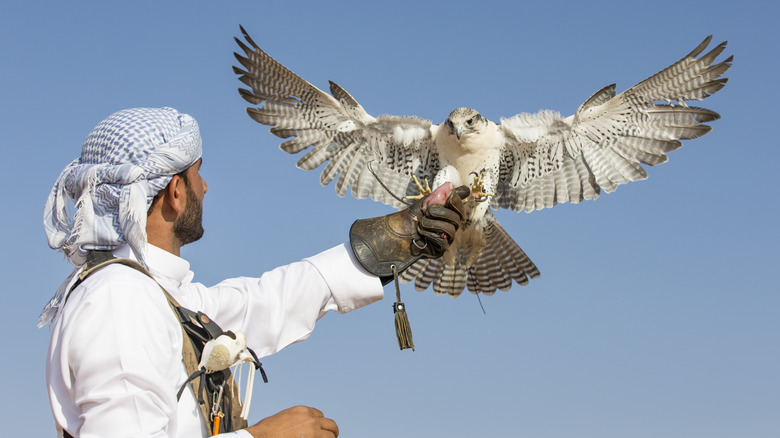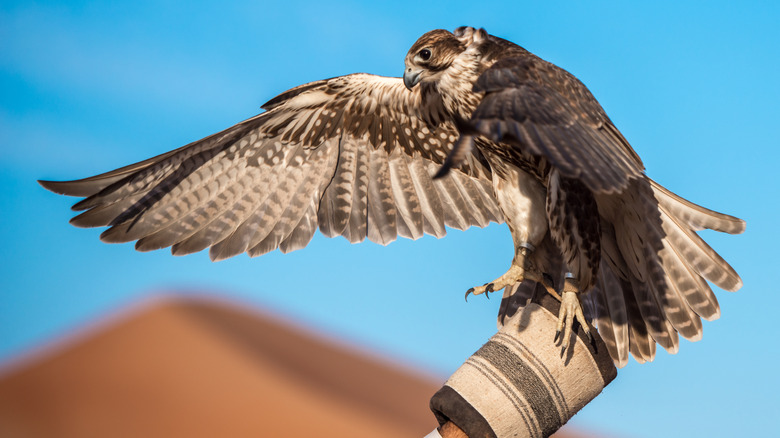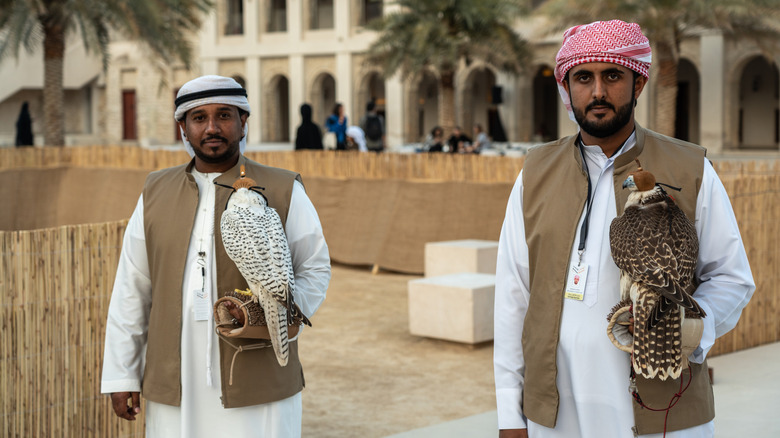These Major Middle Eastern Airlines Actually Allow Live Falcons To Travel In Their Cabins
Traveling with a furry companion can be a bit overwhelming, often requiring extra planning and researching what paperwork you need to travel with your pet. Now, imagine flying with a feathered friend, one known for its hunting instincts, razor-sharp talons, and exceptional eyesight. Several major Middle Eastern airlines now permit live falcons to travel in the cabin alongside their handlers, offering a rare glimpse into the region's deep respect for these majestic birds.
Major airlines in the Middle East, such as Etihad, Emirates, Qatar Airways, and Royal Jordanian Airlines, are stepping up their game when it comes to allowing certain pets on board. Falconers are permitted on some flights to bring their little feathered fighter jets with them on board, in the cabin, and they even have their own passports. While this practice is permitted, it comes with a detailed set of regulations that falconers must follow to ensure the safety and comfort of both the birds and fellow passengers during the flight. You'll also need to have all of the falcon's documentation in order to avoid long airport lines.
Falconry is a highly respected and deep-rooted tradition in Emirati and Middle Eastern culture. These birds are not only astutely trained but also treated with great care and respect. And while first-class airlines like Emirates are already a symbol of luxury, bringing your falcon in the cabin takes the concept of flying like a bird to an entirely new level.
How falconry is soaring to new heights
These magnificent and intelligent birds were once used for catching food, however, these days, they are mostly kept for sport or just as pets. The beloved predators can also be found flying comfortably at 38,000 feet in the clouds. In 2018, Gulf News reported that approximately 28,000 falcons had been issued passports by the UAE government since 2002. Falcon passports are valid for three years, cost about $130, and prevent the smuggling of falcons.
Falcons are considered prestigious birds in the Middle East, and have been part of Middle Eastern culture since pre-Islamic times. Falconry is known to be more than 4,000 years old and has been practiced in various parts of the world. The sport is even on the UNESCO Intangible Cultural Heritage of Humanity list. These highly revered birds are a symbol of luxury and status — a white Gyrfalcon was once sold at a Saudi auction for a record-breaking $466,667.
Falconers are allowed to bring their birds onboard certain airlines, uncaged and perched on their handler's forearm. Qatar Airways allows one falcon per passenger, with a maximum of six in the cabin at one time, all flying in economy. Each bird can cost up to an additional $630. Etihad takes it a step further, permitting falcons in economy, business, and even first-class (yes, they fly better than most of us). Depending on the class, handlers can travel with one or two birds. Emirates allows caged falcons in the cabin on select flights from Dubai to Pakistan, while Royal Jordanian permits falcons in economy only, and all birds must be hooded, with both legs tied securely to the seat.
Falcons and Friendship: A journey of bonding and brotherhood
The relationship between a falcon and its handler is a deep and meaningful bond built over time through patience, commitment, and mutual trust. Falconry is more than a sport in the Middle East; it's a way of life that connects people with nature and tradition. Handlers not only develop a personal connection with their falcons, but also form strong camaraderie with fellow falconers during training sessions based around a common passion, where knowledge is exchanged, skills are fine tuned, and stories are shared.
If you want to make the most out of your next trip to the Dubai desert, visitors can immerse themselves in this ancient tradition by stepping into the world of falconry. It offers a unique opportunity to learn about the discipline, focus, and loyalty of falcons, as well as the daily routines and care by their handlers. Falcons can live up to 25 years, cementing a long-term bond to grow between man and bird.
Al Marri, an experienced falconer, explains to the Khaleej Times that he thinks falconry is a great way for young men to stay out of trouble, specifically, 15 to 19 year olds, saying, "because the boy will learn from the bird and the bird will learn from him, and it will occupy him from everything happening currently. I always advise everyone to get their sons involved and it will occupy them from the negative things that exist."


